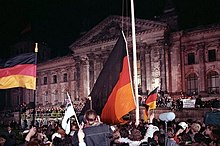National holiday

A national holiday is usually a public holiday on the occasion of an important event for a state , whereby the actually different terms state and nation are equated, i.e. it is assumed that the state is the nation .
Historical events as reference points for the date of national holidays
Many countries celebrate their national day of the founding of the state or at the Erlangen date of independence (USA: Independence Day ). In Germany, October 3, the historic day of German unity (accession of the GDR to the Federal Republic of Germany), is celebrated as a national holiday. Austria celebrates its national holiday on October 26th , the day on which the law on Austrian neutrality was passed in 1955 , thus ending the occupation and post-war period. In Switzerland, August 1st is the Swiss federal holiday in memory of the Federal Letter of 1291 .
France commemorates the storm on the Bastille on July 14th (Fête nationale or 14 juillet) . There are national holidays that relate to the outcome of a war, such as Day of Peace or Day of Victory . A day of liberation to commemorate the surrender of the Wehrmacht and the victory over National Socialist Germany takes place in Italy (April 25), the Netherlands (May 5), Armenia , Azerbaijan , Bosnia and Herzegovina , France , Kyrgyzstan , Poland , Kazakhstan , Serbia , Slovakia , the Czech Republic , Turkmenistan (all on May 8th ), Georgia , Russia , Tajikistan , Turkmenistan, Ukraine , Uzbekistan , Belarus (all on May 9th ) and Albania (November 29th). Sweden celebrates its national holiday on June 6th (day of the Swedish flag), Norway on May 17th on the occasion of the adoption of the Basic Law of 1814 ( constitutional day ). Ireland, on the other hand, set its national holiday on March 17th , also known as St. Patrick's Day .
The Vatican presented its national holiday traditionally on the day of the inauguration of the current pope . During the pontificate of Pope Francis this is March 19th .
Some states also have several national holidays, such as B. India ( Republic Day on January 26th , Independence Day on August 15th and Gandhi Jayanti , the birthday of the “father of the country” Mahatma Gandhi , on October 2nd ).
A few states do not have an official national holiday, such as B. Denmark (unofficially: Grundlovsdag on June 5th) and the United Kingdom (see National Holiday (United Kingdom) ) .
See also
literature
- Martin Krämer: The popular uprising of June 17, 1953 and its political echo in the Federal Republic of Germany (= Dortmund historical studies , volume 17). Brockmeyer, Bochum 1996, ISBN 3-8196-0439-1 (dissertation University of Dortmund 1995).
- Vera Caroline Simon: Celebrated Nation. Culture of remembrance and national holiday in Germany and France since 1990 (= Campus historical studies , Volume 53). Campus, Frankfurt am Main / New York 2010, ISBN 978-3-593-39192-2 (Dissertation European University Institute Florence 2009).
Web links
Individual evidence
- ↑ Art. Vatican State on the website of the German Bishops' Conference , accessed on February 12, 2019.